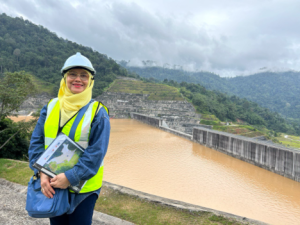Malaysia

Related Research:
My innovative research focuses on advancing technology for climate resilience and adaptation, crucial in combating climate change. Leading my team, I have developed techniques to enhance dam safety and resilience, providing dam owners with data-driven decision-making tools to maintain structural integrity. Key contributions include pioneering methods for assessing dam risk, breakthroughs in dam break analysis, and establishing impact-based forecasting systems for proactive emergency response measures. I also advocate for Community-Based Resilience (CSR) analysis to ensure infrastructure prioritizes community safety amidst climate challenges. Significant projects include the TNB Dam Safety Programs, which integrate advanced risk assessment methodologies, probabilistic modeling, and geospatial analysis to evaluate dam risks. The “Dam Break Modelling and Flood Inundation Mapping for Emergency Management Planning for All TNB Dams” project, awarded by TNB Genco in 2022, has enhanced our understanding of dam failure dynamics and facilitated the development of tailored response strategies and emergency preparedness measures. As Project Manager of the Impact-Based Forecasting Project, I successfully launched this system in the Kelantan River and expanded it to 34 river basins in Peninsular Malaysia in 2020. Additionally, the Integrated System for Predictive and Responsive Emergency Management (INSPiRE) enhances emergency preparedness and response capabilities, safeguarding communities from climate-related disasters. My advocacy for CSR prioritizes the safety and well-being of communities impacted by dam infrastructure and climate change. The Yayasan Canselor UNITEN (YCU) community project in Cameron Highlands involves public awareness activities, sedimentation control, and long-term preservation practices. Additionally, a Translational Research Grant from Ministry of Higher Education (MOHE) supports a sustainable hydropower project to improve the socio-economic standards and the safeguard of the local community. During critical incidents like the Kenyir Dam Landslide in February 2022, my expertise and leadership were crucial in providing decision support to dam owners, emergency response agencies, and government authorities. Drawing from our extensive experience, our expertise extends beyond Malaysia and can be effectively applied to dams in SEA regions or worldwide. Overall, my hard work has had a transformative impact on the safety and resilience of dam infrastructure, setting new standards for risk management, emergency preparedness, community engagement, and decision support in the field of dam engineering. My commitment to saving lives, protecting communities, and ensuring the longevity of critical infrastructure demonstrates the profound influence of research-driven innovation on public safety and disaster resilience in the face of complex challenges and uncertainties. My dedication to advancing dam risk evaluation through innovative techniques, data-driven decision-making, and proactive risk management strategies underscores my commitment to enhancing dam safety, resilience, and disaster preparedness. By bridging the gap between research and practice in dam engineering, I play a pivotal role in mitigating risks, protecting communities, and securing critical infrastructure against potential hazards and challenges.
Relation to Climate Resilience and Adaptation Theme:
My research in climate resilience and adaptation focuses on advancing technology in dam safety and community-based resilience. This involves pioneering risk assessment, impact-based forecasting, and CSR analysis to set new standards for infrastructure safety and well-being. By integrating these innovative approaches, my research aims to enhance resilience strategies, improve preparedness for climate-related challenges, and strengthen the capacity of communities to adapt and thrive in the face of environmental and climate changes. Through interdisciplinary collaboration and stakeholder engagement, I have developed comprehensive solutions included (i.e) Hydrodynamic Flood Forecasting Models (FaMOUS), TNB Dam Safety Policy, Dam Break and Flood Hazard Community Mapping Tools (INSPIRE), Risk-Informed Decision Making for Dam Safety (RIDM-DaMS) that address the complex and interconnected challenges posed by climate change, aiming to build a more resilient and sustainable future for all living at downstream of the dams.
Affiliated Organisation:
Universiti Tenaga Nasional (The Energy University), Malaysia
